June's Recipe: Papoutsákia
(Stuffed
Eggplant "Little Slippers")
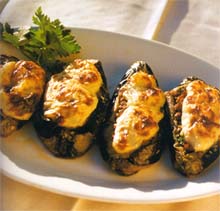
|
|
Ingredients: |
- 4
medium eggplants
- olive
oil for frying
- 2
onions, finely chopped
- 10 oz
ground beef or lamb
- 1 Tbs.
tomato purée
- 3 lg.
tomatoes, peeled & diced
- 1
bunch fine-chopped parsley
- 2 Tbs.
breadcrumbs
- 1.5 c.
kefalotíri
cheese, grated
- 3 Tbs.
butter
- 2 Tbs.
flour
- 2 c.
milk
- 2 Tbs.
lemon juice
-
freshly grated nutmeg
- 1 egg,
beaten
- salt &
fresh-ground pepper
|
|
Preparation:
Wash
the eggplants and remove the base of the stalks.
Heat olive oil in a pan and brown the eggplants on
all sides over a high heat. Allow to cool, and cut
off one third lengthways.
Scoop out the flesh from
the remainder with a spoon, leaving a 3/8-inch (1
cm) thick edge, finely chop the flesh and set aside.
Preheat
oven to 375º. For the filling, heat some olive oil
and fry the onions and tomato purée, and diced
tomatoes and simmer gently for about 5 minutes. Stir
in parsley, bread crumbs, and half the cheese.
Place
eggplant halves on a greased baking sheet, and fill
with the ground beef mixture. Melt the butter in a
pan and stir in the flour. Stir in the milk and
allow to thicken slowly.
Simmer for about 5 minutes,
and season with lemon juice, nutmeg, salt and
pepper. Allow
the sauce to cool, and stir in the egg and the
remaining cheese.
Pour over the filled eggplants and
bake in preheated over for about 50 min. Serve
hot, with freshly baked white bread.
|
|
|
|
|
June's
Article: |
|
The
Kafeníon |
|

Photographs and
Excerpts from:
Culinaria Greece
by Milona, Marianthi
The kafeníon -
the men's coffeehouse - is an altogether Greek
institution. You used to see them everywhere, in the
main square of every village, in every part of town
and at every major city crossroads. Although they
may have lost some of their importance in modern
times, they still exist in the more rural areas, in
small towns and on the islands. This is where the
men meet up to talk about the harvest, complain
about a bad crop, or grumble about the failure of
Brussels' agricultural policy. Family tragedies and
personal crises are discussed alongside politics.
Anything and everything can be a potential topic of
conversation. They argue, discuss, shout, and make
jokes. Anyone preferring quiet and contemplation can
let his thoughts wander in rhythm with the
kombolói running through his fingers.
[READ MORE ABOUT KOMBOLÓI
BELOW]
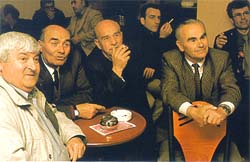 They
sit over a cup of mocha coffee, a glass of water, or
even a glass of wine or ouzo. There is no food
available here, except perhaps for a bowl of peanuts
to accompany the ouzo. Hours can slip by in this way
before the men have have finally seen, talked,
played, and drunk enough. Happy and content, they
leave this exclusively male world in the knowledge
that the kafeníon will still be waiting for
them in the same place tomorrow. The kafeníon is likely
to be fairly sparsely furnished with simple chairs
and tables, yet there is something enduring and They
sit over a cup of mocha coffee, a glass of water, or
even a glass of wine or ouzo. There is no food
available here, except perhaps for a bowl of peanuts
to accompany the ouzo. Hours can slip by in this way
before the men have have finally seen, talked,
played, and drunk enough. Happy and content, they
leave this exclusively male world in the knowledge
that the kafeníon will still be waiting for
them in the same place tomorrow. The kafeníon is likely
to be fairly sparsely furnished with simple chairs
and tables, yet there is something enduring and
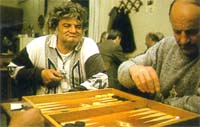 timeless about it which has remained unchanged
despite the great social changes within Greece. The
classic kafeníon has managed to maintain its
role in Greek life in the face of the dynamic
developments of the modern age.
While cafés in the
big towns have moved on to become meeting places for
young people of both sexes, everything here has
stayed pleasantly the same. Women do not feel they
are missing out on anything in this male domain and
they uphold it as part of the traditional role
allocation. Women have their own get-togethers, for
instance at the former village washhouse or over
coffee on a neighbor's terrace. timeless about it which has remained unchanged
despite the great social changes within Greece. The
classic kafeníon has managed to maintain its
role in Greek life in the face of the dynamic
developments of the modern age.
While cafés in the
big towns have moved on to become meeting places for
young people of both sexes, everything here has
stayed pleasantly the same. Women do not feel they
are missing out on anything in this male domain and
they uphold it as part of the traditional role
allocation. Women have their own get-togethers, for
instance at the former village washhouse or over
coffee on a neighbor's terrace.
|
|
|
KOMBOLÓI - Greek Worry Beads
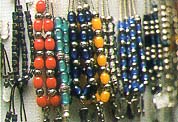 The KOMBOLÓI,
or string of beads, are a familiar sight in
the hands of many Greek men. A
tradition originally inherited from the
Orient, the Turks introduced
kombolói to Greece
via India and Persia. Although Muslims
commonly run their fingers through the beads methodically as a way of counting
prayers, they were inherited by Greeks
originally as a plaything. They are always
designed with an uneven number of beads. The word
kombolói incorporated the word kómbos,
meaning "knot", and there is a fascination and magic
derived from these "knots" running through your fingers.
During the course of a man's life, his
kombolói becomes a sort of talisman and there
are old men who fall into a deep depression
if they lose their personal
kombolói - their lifelong companion. More than just a means of
passing time, one is tempted to say that the
kombolói reflects a way of life. There is the
sound of the beads clicking together, the
feel of the smooth beads between your
fingers, the hours that slip away while
playing with the beads, inducing an almost
trance-like state. And one very basic lesson to be learned from
playing with the
kombolói beads is that is that the circular
string of beads symbolizes the belief that
everything returns, nothing really ends; in
other words, the belief in infinity. The KOMBOLÓI,
or string of beads, are a familiar sight in
the hands of many Greek men. A
tradition originally inherited from the
Orient, the Turks introduced
kombolói to Greece
via India and Persia. Although Muslims
commonly run their fingers through the beads methodically as a way of counting
prayers, they were inherited by Greeks
originally as a plaything. They are always
designed with an uneven number of beads. The word
kombolói incorporated the word kómbos,
meaning "knot", and there is a fascination and magic
derived from these "knots" running through your fingers.
During the course of a man's life, his
kombolói becomes a sort of talisman and there
are old men who fall into a deep depression
if they lose their personal
kombolói - their lifelong companion. More than just a means of
passing time, one is tempted to say that the
kombolói reflects a way of life. There is the
sound of the beads clicking together, the
feel of the smooth beads between your
fingers, the hours that slip away while
playing with the beads, inducing an almost
trance-like state. And one very basic lesson to be learned from
playing with the
kombolói beads is that is that the circular
string of beads symbolizes the belief that
everything returns, nothing really ends; in
other words, the belief in infinity.
GreekShops
carries a wide array of
kombolói in all colors and sizes!
Here are some of our most popular styles!
|
|
|
|
Special Feature: Heritage Walks in
Athens |
|
4th Heritage Walk:
The City Center from Antiquity to the Ottoman Period |
|
(Continued from
May's Issue)
|
STARTING POINT: Thisio Station
TERMINUS:
Acropolis Station |
The 4th walk takes us through all the centuries of
the Athenian past; including those in which the city
had been seriously
diminished in size and had lost its allure for the
outside world. The visitor will enjoy some fine
views and also
masterpieces of art and architecture. |
|
Click
here
to read the full
article
on additional page |
|
-
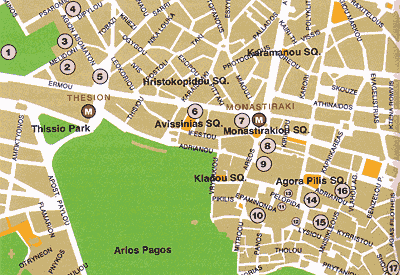 (1) KERAMEIKOS: The official cemetery of ancient
Athens from the 11th century BC until the 2nd
century AD. The region received its name from the
existence in the vicinity of many pottery or ceramic
workshops. The walls of ancient Athens: One can
still see the "lithologimata",
three consecutive rows of stones that date from the
classical times. (1) KERAMEIKOS: The official cemetery of ancient
Athens from the 11th century BC until the 2nd
century AD. The region received its name from the
existence in the vicinity of many pottery or ceramic
workshops. The walls of ancient Athens: One can
still see the "lithologimata",
three consecutive rows of stones that date from the
classical times.
Kerameikos Gates:Holy Gate: Dipylon: The Kerameikos
Gates are the name of the official entrances to
ancient Athens at
this point. These gates divided the area into the
inner and outer Kerameikos, where the tombs were
placed...
Street of the Kerameikos: Just outside the Dipylon
gate began the imposing Street of the Kerameikos,
the so-called "Road to the Academy" that
led to the most beautiful of the...
Kerameikos Museum: It holds a large
and varied collection of burial vessels
that date from the 11th century BC
(Sub-Mycenaean period) until the 2nd
century AD (Roman era), and...
-
(2)
THE JEWISH SYNAGOGUE: The Beth Shalom Synagogue
was built in 1935. The Romaniote Synagogue, exactly
facing the former, was built in 1904 and
is still in function but only...
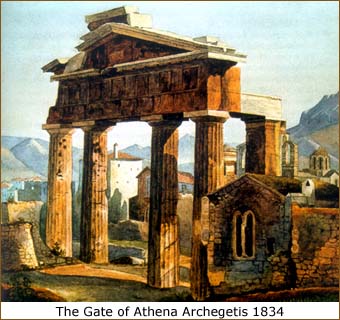
-
(3)
MUSEUM OF TRADITIONAL POTTERY: An interesting
Museum displaying modern Greek ceramics, with
representative pieces of
work made in workshops from all over Greece, and a
large collection of vessels. It is housed in a
19th century neoclassical
building.
-
(4) BENAKI MUSEUM OF ISLAMIC ART: Antonis Benakis
lived in Alexandria and was one of the
first collectors of Islamic works of
art. His collection includes 10,000
pieces covering 13 centuries of artistic
creation, and is considered one of the
best of its kind in the world. The
exhibits are...
-
(5)
CHURCH OF AGHIOI ASOMATOI: A four-columned
cross-in-square church with an Athenian-style dome
(second half of the 11th
century). Restoration work in 1955-60 altered the
original Byzantine style.
-
(6) ABYSSINIA SQUARE: Abissinia
was once a name for Ethiopia, so
probably this square was named after the
few Ethiopians who once lived here. It
is also known as...
-
(7)
MONASTIRAKI - PANTANASSA: Built in the 15th
century as a basilica, probably
incorporating the ruins of an older
church. Once the main church of a
women's monastery, and a...
-
(8)
TZISDARAKI MOSQUE: Built in 1759 by Tzisdarakis,
then Voevod of Athens, who removed the 17th column
from the Olympieion, and turned it into lime to
build the mosque. After this...
-
(9)
HADRIAN'S LIBRARY: A rectangular building (122 x
82m) built in 132 AD by the Roman emperor Hadrian.
Seen from above,
it formed a peristyle courtyard (that is with a
colonnade), with special rooms for
keeping papyri and books, lecture halls,
etc. The impressive...
-
(10)
ROMAN AGORA: The natural extension of the
ancient Greek Agora, built in the second half of the
1st century BC, with
donations from Julius Caesar and Augustus.
The Agora building (111 x 98 m.) had a large
rectangular atrium surrounded by stoas, shops, and
storerooms...
-
(11) FETHIYE DJAMI - MOSQUE OF THE CONQUEROR: Built
in the 16th century, on the ruins of an early
Christian basilica,
within which a small mihrab had been formed for the
visit of Mehmet II the Conquer in 1458. That is how
the present building obtained its name.
After the...
-
(12)
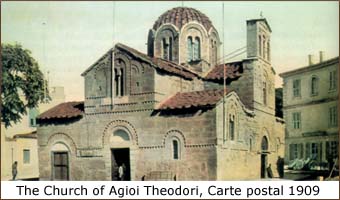 CLOCK OF ANDRONICUS CYRRISTOS or TOWER OF THE WINDS: An intriguing structure that had a hydraulic
mechanism. This
1st century BC octagonal tower was built by
Andronicus, an astronomer from the Syrian city of Cyrros, a city founded by... CLOCK OF ANDRONICUS CYRRISTOS or TOWER OF THE WINDS: An intriguing structure that had a hydraulic
mechanism. This
1st century BC octagonal tower was built by
Andronicus, an astronomer from the Syrian city of Cyrros, a city founded by...
-
(13)
MEDRESE: Built in 1721 as an Islamic religious
school. After liberation from Ottoman
rule, it served as a prison. Only the
entrance remains...
-
(14)
GREEK FOLK MUSIC MUSEUM: The former residence
of the professor of the literature, and Minister in
King Otho's
government, Georgios Lassanis, now displays a
collection of 1,200 Greek...
-
(15)
THE HAMAM OF ABIT EFFENDI: The impressive
Athens Hamam (Baths) on Kyrristou St, a rare example
of its kind in Greece, has been restored
to its original form. It dates from...
-
(16)
BENIZELOS HOUSE: The oldest surviving mansion
in Athens (17th - 18th century), once owned by the Benizelos -
Palaiologos family, second in rank among the 12
leading families...
-
(17)
CHURCH'S TOWER: A building complex on the
corner of Hill and Epiharmou Streets that dates from
the 18th and 19th centuries, widely known as
"Church's Tower"...
-
TRIPODON ST
-
ELLINIKI ETAIRIA
-
LYSICRATES' MONUMENT
-
ACROPOLIS STATION (M)
|
 |
To read about these 4
locations, please refer to our March
newsletter featuring
Heritage Walk #1 |
Excerpt from: "Heritage Walks in Athens"
by the Municipality of Athens Cultural
Organization,
and by the Elliniki Etairia Hellenic Society
for the Protection of the Environment and
the Cultural Heritage
|
Click
here
to read the full
article
on additional page |
|
Next
Month's Article:
Heritage Walk #5: MEDIEVAL AND CLASSICAL ATHENS |
|
|
|
What's
New! |
|
CDs |

Elena Paparizou, Vrisko
To Logo Na Zo
|

Maria Farandouri,
Way Home |

Dinata, Best Of 1986-2007 2CD + DVD & New Track |

Kelly
Kelekidou, Makria Sou Den Iparho |

Yianna
Terzis, Ase Me Na Taxidepso
|

Kalomira, Secret Combination - Full Version |

Kalomira, Secret Combination CD Single
|

Matheos
Giannoulis & Lefteri Vazeos, Tha To Rixo Exo
|

C:Real, Invain |

Yiannis Parios,
Pou Pame Meta |

George Dalaras, Tragoudia Me Ousies Live (2CD) + Bonus
DVD + Booklet |

Synthesi, Danceology - Dance Till You Drop |

Souxe Winter Mix 2008 by DJ Valentino 2-CD set |

Themis Adamantidis, Dodeka Feggaria CD Single
|

Petros
Gaitanos, Odes Arhaggelon 2CD + Bonus DVD
|

Hro, Allazo |

Nikos Karvelas, Trakter |

Fresca 2008 2CD + DVD |

Giorgos Koros and Xanthi Peraki, To Megalo Panigiri |

Giorgos Koros, Tsiftetelia Dalkadiarika ( Instrumental
Tsiftetelia )
|
|
|
DVDs |
|
|
|
Books - Literature & Fiction in Greek |
|
|
|
Books for Children in Greek |
|
|
|
|
|
Only 60 Days Left Until
the Beijing 2008 Olympics! |
 |
|
|
Greek Sports Apparel & Gifts - Get Ready for Euro 2008! |
|
|
|
New
Koukla Women's Apparel - Just in Time for Summer! |
|
|
|
New
Evil Eye Bracelets |
|
|
|
Featured Destination: Kasos |
|
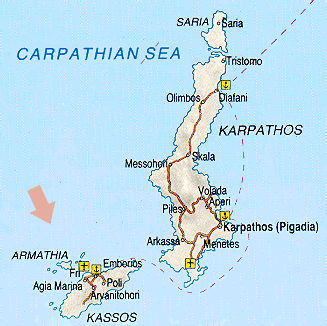 GEOGRAPHY: Very close to the southwest coast of
Karpathos and 27 nautical miles from Crete, Kasos is the
southernmost island of the Dodecanese. 66 sq. km. in
area, it has 50 km. of coastline, a population of 1,184
and is 220 nautical miles from Piraeus. There are car
and passenger ferries from Piraeus twice a week, as well
as the rest of the Dodecanese and Crete. The boat on the
Piraeus - Kavala route to the outlying islands connects
it with Melos, Pholegandros, Anaphi, Santorini, Leros,
Leipsoi, the northeast Aegean islands and Kavala. A
local service operates among the Dodecanese and there
are flights, via Rhodes, to Athens. A predominantly
mountainous island (highest peak Prionas, 600 m. a.s.l.),
the coast has steep cliffs with very few stretches of
sand and there is minimal touristic development. The
island is ideal for those seeking peace and quiet, close
to nature. GEOGRAPHY: Very close to the southwest coast of
Karpathos and 27 nautical miles from Crete, Kasos is the
southernmost island of the Dodecanese. 66 sq. km. in
area, it has 50 km. of coastline, a population of 1,184
and is 220 nautical miles from Piraeus. There are car
and passenger ferries from Piraeus twice a week, as well
as the rest of the Dodecanese and Crete. The boat on the
Piraeus - Kavala route to the outlying islands connects
it with Melos, Pholegandros, Anaphi, Santorini, Leros,
Leipsoi, the northeast Aegean islands and Kavala. A
local service operates among the Dodecanese and there
are flights, via Rhodes, to Athens. A predominantly
mountainous island (highest peak Prionas, 600 m. a.s.l.),
the coast has steep cliffs with very few stretches of
sand and there is minimal touristic development. The
island is ideal for those seeking peace and quiet, close
to nature.
HISTORY: Phoenicians are mentioned as the
island's first inhabitants and its history has always
been linked with that of neighboring Karpathos . In
historical times its fate differed little from that of
the rest of the Dodecanese and its capital was Polion.
From the end of the 13th century it belonged to the
Knights of St. John until about the middle of the 16th
century when it was subjugated by the Turks. An island
with a great tradition in seafaring, its boats played
their part in the 1821 Struggle for Independence. In May
1824 Kasos suffered the worst catastrophe in its history when it was set on fire by
the combined Turkish and Egyptian fleet. There was only
a handful of survivors. Kasos became part of the Greek
state in 1948.
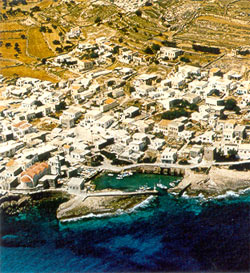 |
SIGHTS and MONUMENTS: The island's
capital, Phry ( Orphys ), is built at the far
end of the gulf of Bouka. Several old
captain's houses set on the hillside are
still preserved. In the local museum there
is a small archaeological and folk art
collection. 1 km. southwest of Phry, at
Aghia Marina, there are several churches, as
well as the Ellinokamara. |

Road Map of
Karpathos and Kassos |
|
On the other shore of the gulf, east of Phry, is Emboreios with
its three-aisled church of the Virgin. 3 km.
southeast of here is the old capital of
Kasos, Polion, where there are remains of a
fortress and church of the Holy Trinity.
There are notable churches at Panaghia (1
km. east of Phry), dedicated to the Virgin
and housing the coffin of Hosia Kassiani and
another of the Sts. Anargyroi. At Chadies
(12 km. southwest) is the monastery of St.
George and at Apokrani that of St. Mamas.
Although the steep coast of Kasos is not
really suitable for swimming it offers good
fishing. |
|
| |
|
June 2008 Greek Orthodox Calendar |
|
Sunday |
Monday |
Tuesday |
Wednesday |
Thursday |
Friday |
Saturday |
1
Sunday of the Blind Man
Martyr Justin the Philosopher
Righteous Pyrrus |
2
Nicephoros,
Abp. of Constantinople
Erasmos of Ochrid & his Companion Martyrs |
3
Martyrs Lucillian and Paul
Athanasios the Wonderworker |
4
Metrophanes, Abp. of Constantinople
Martha and Mary, Sisters of Lazarus |
5
Holy Ascension
Hieromartyr Dorotheos
10 Martyrs of Egypt |
6
Hilarion the New
Bessarion the Wonderworker of Egypt |
7
Hieromartyr Theodotos
Righteous Panagis
|
8
Fathers of the 1st Council
Relics of Theodore Stratelates
Martyr Kalliope |
9
Cyril, Abp. Of Alexandria
3 Virgin-martyrs of Chios |
10
Martyrs Alexander & Antonina
Hieromartyr Timothy |
11
Apostles Bartholomew & Barnabas
Revelation of Axion Estin |
12
Righteous Onouphrios
Peter of Athos |
13
Martyr Akylina
Triphyllos the Bishop of Nicosi |
14
Saturday of Souls
Prophet Elisha
Methodios the Confessor |
15
Pentecost - Trinity Sunday
Prophet Amos
Father Hieronymus |
16
Tychon the Wonderworker
40 Martyrs of Rome |
17
Martyr Isaurus & Companions
Martyrs Manuel, Sabel & Ismael |
18
Martyr Leontios & Companions
|
19
Apostle Jude
Martyr Zosima |
20
Hieromartyr Methodios
Father Callistus |
21
Martyr Julian
Hieromartyr Terence of Iconius |
22
All Saints
Hieromartyr Eusebius
Martyrs Zenon and Zena |
23
Martyr Agrippina
Martyr Aristocleus |
24
Elizabeth, Mother of the Forerunner |
25
Apodosis of the Forerunner
Martyr Fevronia
Prokopios the New Martyr |
26
New Martyr David
Appearance of the Icon of Our Most Holy Lady the
Theotokos of Tikhvin |
27
Sampson the Innkeeper
Joanna the Myrrhbearer |
28
Relics of Unmercenaries Cyril & John
Pappias the Martyr |
29
Peter and Paul, the Holy Apostles
Apostles Peter and Paul |
30
Synaxis of the 12 Apostles
Michael the New Martyr of Athens |
|
|
|
|
|
|
|
Icons
depicting the celebrated Saint, make great gifts for
namedays, as do our custom-made Greek name mugs.
Shop among our great collection of gift ideas at our
store. We also have a great selection of greeting cards
for birthdays, holidays, namedays and
special occasions.
|
|
Share
With Others! |
Let your family and friends share the savings by
forwarding them this email.
|
|
Suggestions
& Comments |
Dear Greekshops.com customer,
Thank you for contributing to our effort to bring
unique and hard to find Greek products to your home. We
value your opinion, so please let us know if you have
any concerns, suggestions, comments that will improve
and help us grow. Send us your feedback at:
[email protected]
|
|
Subscription
Information |
|
Missed an issue of our
newsletter? Now you can access past newsletters by
visiting
http://www.greekshops.com/newsletters_archive
To
unsubscribe from our mailing list,
click here
|
|
|
|

